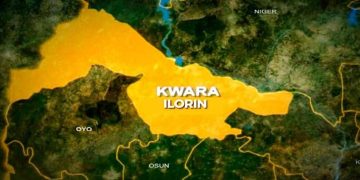The Kwara State Government has ordered the immediate closure of schools across four Local Government Areas due to fresh security threats. The directive affects schools in Isin, Irepodun, Ifelodun and Ekiti LGAs.
The order was conveyed through a statement issued by the Nigeria Union of Teachers, Kwara State Wing. The union’s chairman, Yusuf Agboola, told school heads that the instruction came directly from the Ministry of Education and Human Capital Development.
According to the circular, schools must remain closed until further notice to prevent further attacks linked to the rising insecurity in Kwara South.
Agboola emphasised that the directive “should be treated with utmost urgency,” assuring teachers that more information would be communicated as the situation unfolds.
Governor Abdulrahman Abdulrazaq has announced that the state will push for the establishment of a Forward Operating Base of the Nigerian Army and a Mobile Police Squadron in Eruku, an Ekiti LGA community hit by a deadly Tuesday night attack.
Bandits invaded a church during a thanksgiving service, killing three worshippers and abducting more than 35 people.
During his visit to the town, the governor explained that he had contacted the General Officer Commanding 2 Division and the Inspector General of Police on the urgent need for permanent security presence.
He described the attack as “deeply unfortunate,” noting that President Bola Tinubu had cancelled an international engagement due to the security crises in Kwara and Kebbi states.
Families of victims and community youths criticized the police for allegedly failing to intervene despite being stationed nearby.
A resident, Adesuyi Joshua, whose wife and granddaughter were kidnapped, recounted how worshippers initially mistook gunshots for firecrackers until the situation turned chaotic. He claimed that the police tear-gassed locals who attempted to pursue the attackers.
Another resident, youth leader Shola Peters, alleged that despite community support, local police “abandoned the town at its most critical moment.”
He insisted that the community must be allowed to defend itself, saying, “Give us weapons. We built houses for the police, yet when bandits came, we were left alone.”
The leader of the attacked church, Pastor Lawrence Abiodun Bamidele, said the congregation was celebrating the release of 18 previously abducted residents when the bandits struck.
Three members died instantly, while dozens were whisked away after gunmen allegedly surrounded the church and positioned snipers in a nearby tree.
Religious leaders described the attack as a direct provocation against the Christian faith, calling for a serious government response.
Earlier, protesting youths barricaded the Ilorin–Kabba highway with bonfires, stones and logs. They accused security operatives of “complete negligence,” insisting that the attack lasted nearly an hour without intervention.
A vigilante revealed that local forest guards had been taken for training two days before the incident, comparing the development to previous attacks in other parts of the state. He urged the government to investigate possible sabotage.
The State Commissioner of Police, Adekimi Ojo, visited the scene, promising a full investigation and increased deployment, including a permanent Armoured Personnel Carrier.
Speaking to the governor, the Owa of Eruku, Oba Busari Arinde Oyediran Olanrewaju, lamented that the community had endured kidnappings for months, spending personal funds to free abducted farmers, traders and teachers.
He warned that deteriorating roads were aiding the escape of attackers, making intervention slow and risky.
The Eruku attack highlights growing insecurity in border areas linking Kwara with Kogi and Ekiti States. Security analysts say bandits escaping military pressure in neighbouring forests increasingly settle in the zone, aided by poor roads and weak security presence.
Governor Abdulrazaq’s push for a permanent army base and a Mobile Police Squadron marks the state’s first major step toward sustained military occupation of troubled border communities.















